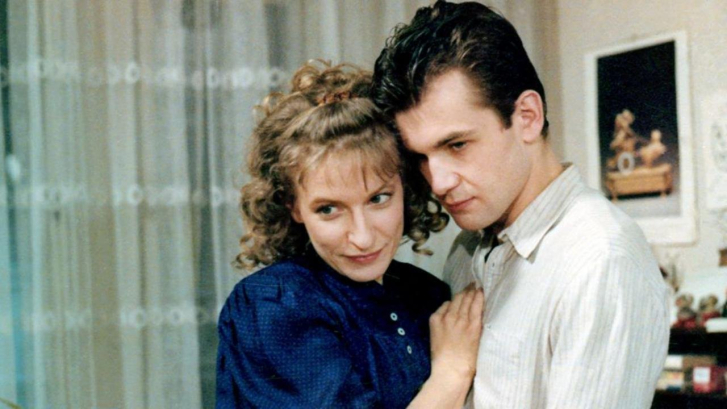Coming Out

The young teacher Philipp Klahrmann takes his first class of sixth formers. Inspired by his new position he makes a date with his colleague, Tanja. The pair gets quite carried away during the evening and they sleep together. This comes as a surprise for both of them for different reasons. Tanja is a shy and introverted girl and would never have thought that a man like Philipp would be interested in her. Whilst still a schoolboy, Philipp had always felt a strong attraction to his schoolmate, Jakob, an attraction which Jakob also returned. Philipp’s imploring parents begged him to keep away from Jakob and Philipp obeyed them. Since then, he has lived alone. The relationship with Tanja fills Philipp with pride and new self-confidence. One day, however, Philipp meets Jakob and the encounter affects him deeply. Nevertheless he is determined to make his relationship with Tanja work. One evening as Philipp is queuing up for concert tickets, he meets a boy and they both fall in love with each other. Philipp secretively steals away from Tanja to his new love Matthias’ birthday party. Both boys are overjoyed to have found each other and they refuse to part. What will happen to Tanja who is so in love with her boyfriend? Philipp does not want to live with her any more but is not capable of telling her his real reasons. In spite of Philipp’s strange behavior Tanja believes in her happiness, especially when she discovers that she is pregnant and Philipp promises never to leave her. Matthias appears while the couple is attending a concert and feels betrayed when Philipp introduces him to his wife, Tanja. Matthias runs away in despair and Philipp and Tanja part bitterly. Philipp searches for his friend day and night – in vain. He neglects his teaching and the pupils who need him. He is maddened by desire for Matthias and disgusted by the circumstances in which homosexuals are obliged to meet, a milieu which he now gets to know in all its aspects…
Widely discussed before its release COMING OUT remains the only East German feature film openly addressing homosexuality. Premiered on November 9, 1989, the very night the wall came down, despite the turmoil outside the audience insisted on the continuation of the screening. Heiner Carow, who was one of the most successfull DEFA directors at the time ("DIE LEGENDE VON PAUL UND PAULA - THE LEGEND OF PAUL AND PAULA", 1973, "IKARUS", 1975) realized the coming-out story of a young teacher at several gay locations in East Berlin, and also made visible other subcultures which were nonexistent in the official discourse. The film missed to completely unfold its impact on society since the political vacuum in the GDR and then the changes in the overall political situation were all-dominant. (Cesta Film Series)
details
-
Runtime
109 min -
Country
Germany (GDR) -
Year of Presentation
1990 -
Year of Production
1989 -
Director
Heiner Carow -
Cast
Matthias Freihof, Dagmar Manzel, Dirk Kummer, Michael Gwisdek, Werner Dissel, Gudrun Ritter, Walfriede Schmitt, Axel Wandtke, Pierre Sanoussi-Bliss, Thomas Gumpert, Robert Hummel, Gertraud Kreißig, Gudrun Okras, Joachim Pape, Cornelia Schirmer, René Schmidt, Ursula Staack, Horst Ziethen, Dr. Maria Planitzer -
Production Company
Defa -
Berlinale Section
Competition -
Berlinale Category
Feature Film -
Teddy Award Winner
Best Feature Film
Biography Heiner Carow
Born in Rostock on 19.9.1929. From 1950 studied at the DEFA training studios as director, later in the DEFA studio for public education films, where he was assistant to the director Gerhard Klein. Made his first documentary in 1952, has been a feature film director with DEFA since 1956. Two stage productions at the Rostock Volkstheater: "Der Stellvertreter" by Rolf Hochhuth (1966) and "Ich bin einem Mädchen begegnet" by Rainer Kerndl (1969).
Filmography Heiner Carow
1968 Die Russen kommen | 1973 Die Legende von Paul und Paula